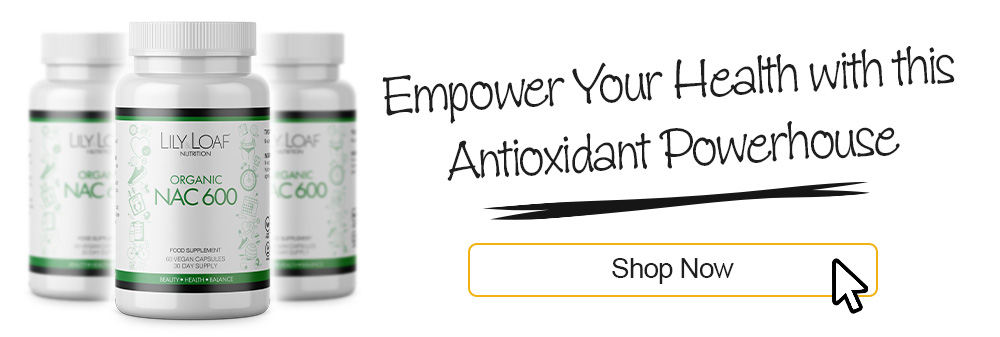
In the quest for optimal health and wellness, natural supplements have gained significant attention.
One such supplement that has been making waves in the health community is NAC 600. But what exactly is NAC, and why is it becoming a go-to for those looking to boost their health naturally?
This blog will delve into the benefits, uses, and scientific backing of NAC 600, offering you a detailed understanding of why it might be the perfect addition to your wellness regimen.
• Understanding NAC: What is N-Acetyl Cysteine?
N-Acetyl Cysteine (NAC) is a derivative of the amino acid L-cysteine, which is found in foods and produced by the body. NAC is renowned for its powerful antioxidant properties, playing a crucial role in the production of glutathione, one of the body’s most important antioxidants. Glutathione helps combat oxidative stress, a factor in many chronic diseases, by neutralising harmful free radicals.
NAC 600 refers to a 600 mg dosage of NAC that is derived from organic sources, ensuring that the supplement is free from synthetic additives and pesticides, making it a cleaner choice for health-conscious individuals.
• The Health Benefits of NAC 600
-
-
Antioxidant Powerhouse
As a precursor to glutathione, NAC boosts the body's antioxidant levels, providing protection against cellular damage caused by free radicals. This is crucial for maintaining overall health and preventing chronic conditions like heart disease and diabetes. -
Detoxification Support
NAC is widely used to support the body's detoxification processes. It helps the liver to detoxify harmful substances, making it particularly useful for individuals exposed to environmental toxins, alcohol, and heavy metals. This detoxifying ability is why NAC is often used in clinical settings to treat acetaminophen (Tylenol) overdose. -
Respiratory Health
One of the most well-documented uses of NAC is its ability to support respiratory health. NAC acts as a mucolytic agent, meaning it helps thin and loosen mucus in the airways, making it easier to expel. This is beneficial for individuals with chronic respiratory conditions like chronic obstructive pulmonary disease (COPD), bronchitis, and asthma. -
Mental Health and Cognitive Function
Emerging research suggests that NAC may have significant benefits for mental health. It has been studied for its potential to alleviate symptoms of psychiatric disorders such as depression, anxiety, bipolar disorder, and schizophrenia. NAC’s antioxidant properties help reduce inflammation and oxidative stress in the brain, which are factors in these conditions. -
Immune System Support
By enhancing glutathione levels, NAC supports the immune system. Glutathione is vital for maintaining the function of immune cells, helping the body to fend off infections and illnesses more effectively. -
Liver Health
Given its role in detoxification, NAC is particularly beneficial for liver health. It helps protect liver cells from damage caused by toxins, which is essential for those with liver conditions or those who consume alcohol regularly. -
Skin Health
NAC’s antioxidant properties also extend to the skin. By combating oxidative stress and supporting detoxification, NAC can help improve skin health, reducing the appearance of fine lines, wrinkles, and other signs of ageing.
-

• How to Incorporate NAC 600 into Your Routine
Integrating NAC 600 into your daily regimen is simple and convenient. The standard dosage is 600mg per day, typically taken in capsule form. However, it’s essential to consult with a healthcare provider before starting any new supplement, especially if you have pre-existing health conditions or are taking other medications.
• Safety and Side Effects
NAC is generally considered safe when taken as directed. However, some individuals may experience mild side effects such as gastrointestinal discomfort, including nausea, diarrhoea, or constipation. These side effects are typically temporary and can be minimised by adjusting the dosage or taking the supplement with food.
It’s important to note that while NAC is beneficial, excessive consumption can lead to adverse effects. Always adhere to the recommended dosage and consult a healthcare professional if you have any concerns.
• The Science Behind NAC: Research and Studies
Numerous studies have explored the health benefits of NAC, providing a strong scientific foundation for its use.
-
-
Respiratory Health
A study published in the European Respiratory Journal highlighted NAC’s effectiveness in reducing mucus production and improving respiratory function in patients with chronic bronchitis. -
Mental Health
Research in the Journal of Clinical Psychiatry showed that NAC supplementation significantly improved symptoms in individuals with treatment-resistant depression. -
Detoxification
According to a review in the American Journal of Therapeutics, NAC is an effective treatment for acetaminophen overdose due to its role in replenishing glutathione levels and supporting liver detoxification.
-
• Conclusion: Embracing the Benefits of NAC 600
NAC 600 is a potent supplement that offers a myriad of health benefits, from boosting antioxidant levels and supporting detoxification to improving respiratory and mental health. Its natural, organic formulation ensures you are getting a pure and clean product, free from harmful additives.
Incorporating NAC 600 into your wellness routine can provide comprehensive support for your body's systems, helping you to maintain optimal health and well-being. As with any supplement, it is important to consult with a healthcare professional to determine the appropriate dosage and ensure it aligns with your health needs.
By harnessing the power of NAC 600, you are taking a proactive step towards a healthier, more vibrant life. Whether you are looking to support your liver, enhance your respiratory function, or boost your overall antioxidant defences, NAC is a versatile and valuable addition to your natural health arsenal.
Disclaimer:
Information and other content provided in Lily & Loaf blogs should not be construed as medical advice and should not be considered a substitute for professional medical expertise. If you have any medical concerns, you should consult with your health care provider.






